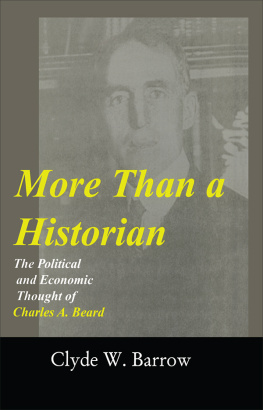More Than a Historian
First published 2000 by Transaction Publishers
Published 2017 by Routledge
2 Park Square, Milton Park, Abingdon, Oxon 0X14 4RN
711 Third Avenue, New York, NY 10017, USA
Routledge is an imprint of the Taylor & Francis Group, an informa business
All rights reserved. No part of this book may be reprinted or reproduced or utilised in any form or by any electronic, mechanical, or other means, now known or hereafter invented, including photocopying and recording, or in any information storage or retrieval system, without permission in writing from the publishers.
Notice:
Product or corporate names may be trademarks or registered trademarks, and are used only for identification and explanation without intent to infringe.
Library of Congress Catalog Number: 00-037391
Library of Congress Cataloging-in-Publication Data
Barrow, Clyde W.
More than a historian : the political and economic thought of Charles A. Beard / by Clyde W. Barrow.
p. cm.
Includes bibliographical references and index.
ISBN 0-7658-0027-6 (alk. paper)
1. Beard, Charles Austin, 1874-1948 Political and social views. 2. Beard, Charles Austin, 1874-1948views on economics. I. Beard, Charles Austin, 1874-1948. II. Title.
JC212 .B37 2000
320.5 l3092dc21 00-037391
ISBN 13: 978-0-7658-0027-5 (hbk)
List of Figures
The Method of Economic Interpretation
Logical Structure of the Frames of Reference
The Forum Plan
Dedicated to the late Richard Ashcraft, With respect and admiration
AAA | Agricultural Adjustment Act |
AHA | American Historical Association |
APSA | American Political Science Association |
BMR | Bureau of Municipal Research |
BOSAP | Board of Strategy and Planning |
CRA | Capital Reserve Account |
EIS | Export-Import Syndicate |
NEC | National Econom ic Council |
NIRA | National Industrial Recovery Act |
PSQ | Political Science Quarterly |
SIA | Social Insurance Account |
There are several people whose good will and support advanced this project at critical points when it would have been easier to abandon the manuscript. I owe an enormous debt to the late Richard Ashcraft, my dissertation advisor and mentor for nineteen years. Richard Ashcrafts contributions to the new historicism in political theory have played an important role in my conceptualization and execution of the project. Ashcraft insisted that political theorists must not only read texts carefully, but must also be serious historians and competent sociologists, if they are to interpret textual meanings in a way that is relevant to a contemporary audience. Ashcrafts method of interpreting political theory had its epistemological origins in Marxs theory of ideology, while its methodological foundation was based in Karl Mannheims sociology of knowledge. Anyone familiar with those works will recognize their influence on this book.
However, it was Professor Eldon Eisenach at the University of Tulsa who first took a serious interest in my work on Charles A. Beard. After delivering a paper on Beard () at the Southwestern Political Science Association in 1985, Eldon encouraged me to continue my work at a time when most political theorists regarded American political thought as something less than political theory, evidently on the assumption that political theory is a peculiarly European art. At each major juncture in the development of the book, I sought Eldons advice and the book would not have been completed without his encouragement, although he is exonerated from its shortcomings, because I did not always take his advice.
I was also fortunate, at the earliest stages of this project, to receive assistance from Jerome Mileur, the former editor of POLITY and a political theorist at the University of Massachusetts Amherst. Professor Mileur patiently worked with me in responding to scholarly reviewers, and portions of this work appeared in that journal more than a decade ago. Karen Orren, co-editor of Studies in American Political Development, also provided a forum for the publication of two exceptionally long articles on Beard () that would never have been published in less historically oriented political science journals.
As always, the University of Massachusetts Dartmouth librarians spent several years tracking down obscure publications by Charles A. Beard and other authors associated with him. My thanks to Jo-Ann Cooley, Linda Zeiper, and Erika Pereira. Robert Mauro, my former research assistant, spent innumerable hours over a three-year period retrieving interlibrary loans and tracking down bibliographical references, while his own initiative brought several articles to my attention. Importantly, his own enthusiasm for the work forced me to return to it again and again, particularly at those points when I just wanted to be finished with it.
Finally, the author gratefully acknowledges the following publishers:
was published originally as Building a Workers Republic: Charles A. Beards Critique of Liberalism in the 1930s, POLITY (Fall 1997). Both articles are reprinted (with revisions) with the permission of POLITY.
was published originally as The Diversionary Thesis and the Dialectic of Imperialism: Charles A. Beards Theory of Foreign Policy Revisited, Studies in American Political Development (Fall 1997): 248-91. Both articles are reprinted (with revisions) with the permission of Cambridge University Press.
My first encounter with Charles A. Beard was a casual one, but it sparked a curiosity about his work that has lasted more than twenty years. In 1976, while an undergraduate at Texas A&M University at Kingsville, I was sitting in a professors office waiting for him to retrieve some printouts from the university computer center. As students often do in these situations, I began perusing the professors bookshelves and almost immediately my eyes fixed on Charles A. Beards An Economic Interpretation of the Constitution of the United States. I opened the book and began reading what I now know was the introduction to the 1935 edition. I was already fascinated by Marx and Marxism so I found it puzzling that Beard denied being a Marxist. I quickly drew the same conclusion as many previous readers: of course, Beard was a Marxist, but he was writing about the United States for an American audience so he had to deny it. Although I read no more than ten pages of the introduction before the professor returned to his office, the books author, title, and thesis were always returning to my thoughts. Having grown up in south Texas, where every aspect of life was determined by the price of cattle or the price of oil, Beards economic interpretation of history seemed like a self-evident proposition to me.
In graduate school at UCLA, I finally purchased my first copy of Beards classic work on the Constitution and I noticed that other graduate students were constantly drawn to the book on my shelf. Everyone had heard of Charles Beard, everyone knew the title of the book, but everyone was amazed that I had actually read it. Beards book on the Constitution seemed to exert some magical power that was both compelling and repelling to everyone who approached it. I always intended to write a seminar paper on Beard, but it was not until after graduate school that I finally sat down and wrote a paper on










